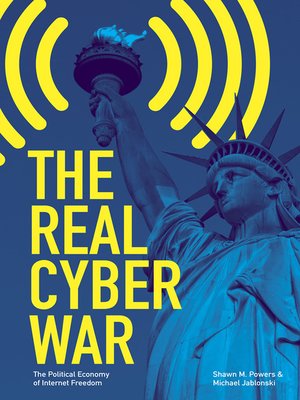The Real Cyber War
ebook ∣ The Political Economy of Internet Freedom · The History of Media and Communication
By Shawn M. Powers

Sign up to save your library
With an OverDrive account, you can save your favorite libraries for at-a-glance information about availability. Find out more about OverDrive accounts.
Find this title in Libby, the library reading app by OverDrive.



Search for a digital library with this title
Title found at these libraries:
| Loading... |
Contemporary discussion surrounding the role of the internet in society is dominated by words like: internet freedom, surveillance, cybersecurity, Edward Snowden and, most prolifically, cyber war. Behind the rhetoric of cyber war is an on-going state-centered battle for control of information resources. Shawn Powers and Michael Jablonski conceptualize this real cyber war as the utilization of digital networks for geopolitical purposes, including covert attacks against another state's electronic systems, but also, and more importantly, the variety of ways the internet is used to further a state's economic and military agendas.
Moving beyond debates on the democratic value of new and emerging information technologies, The Real Cyber War focuses on political, economic, and geopolitical factors driving internet freedom policies, in particular the U.S. State Department's emerging doctrine in support of a universal freedom to connect. They argue that efforts to create a universal internet built upon Western legal, political, and social preferences is driven by economic and geopolitical motivations rather than the humanitarian and democratic ideals that typically accompany related policy discourse. In fact, the freedom-to-connect movement is intertwined with broader efforts to structure global society in ways that favor American and Western cultures, economies, and governments.
Thought-provoking and far-seeing, The Real Cyber War reveals how internet policies and governance have emerged as critical sites of geopolitical contestation, with results certain to shape statecraft, diplomacy, and conflict in the twenty-first century.
| Cover Title Contents Preface List of Abbreviations and Acronyms Introduction: Geopolitics and the Internet 1. Information Freedom and U.S. Foreign Policy: A History 2. The Information-Industrial Complex 3. Google, Information, and Power 4. The Economics of Internet Connectivity 5. The Myth of Multistakeholder Governance 6. States, Intranets, and Sovereignty 7. Internet Freedom in a Surveillance Society Conclusion Notes Index | International Communication Book Award, International Studies Association, 2017. — International Studies Association
|Shawn Powers is an Assistant Professor of Communication at Georgia State University. Michael Jablonski is an attorney and presidential fellow in communication at Georgia State University.
Moving beyond debates on the democratic value of new and emerging information technologies, The Real Cyber War focuses on political, economic, and geopolitical factors driving internet freedom policies, in particular the U.S. State Department's emerging doctrine in support of a universal freedom to connect. They argue that efforts to create a universal internet built upon Western legal, political, and social preferences is driven by economic and geopolitical motivations rather than the humanitarian and democratic ideals that typically accompany related policy discourse. In fact, the freedom-to-connect movement is intertwined with broader efforts to structure global society in ways that favor American and Western cultures, economies, and governments.
Thought-provoking and far-seeing, The Real Cyber War reveals how internet policies and governance have emerged as critical sites of geopolitical contestation, with results certain to shape statecraft, diplomacy, and conflict in the twenty-first century.
| Cover Title Contents Preface List of Abbreviations and Acronyms Introduction: Geopolitics and the Internet 1. Information Freedom and U.S. Foreign Policy: A History 2. The Information-Industrial Complex 3. Google, Information, and Power 4. The Economics of Internet Connectivity 5. The Myth of Multistakeholder Governance 6. States, Intranets, and Sovereignty 7. Internet Freedom in a Surveillance Society Conclusion Notes Index | International Communication Book Award, International Studies Association, 2017. — International Studies Association
|Shawn Powers is an Assistant Professor of Communication at Georgia State University. Michael Jablonski is an attorney and presidential fellow in communication at Georgia State University.






